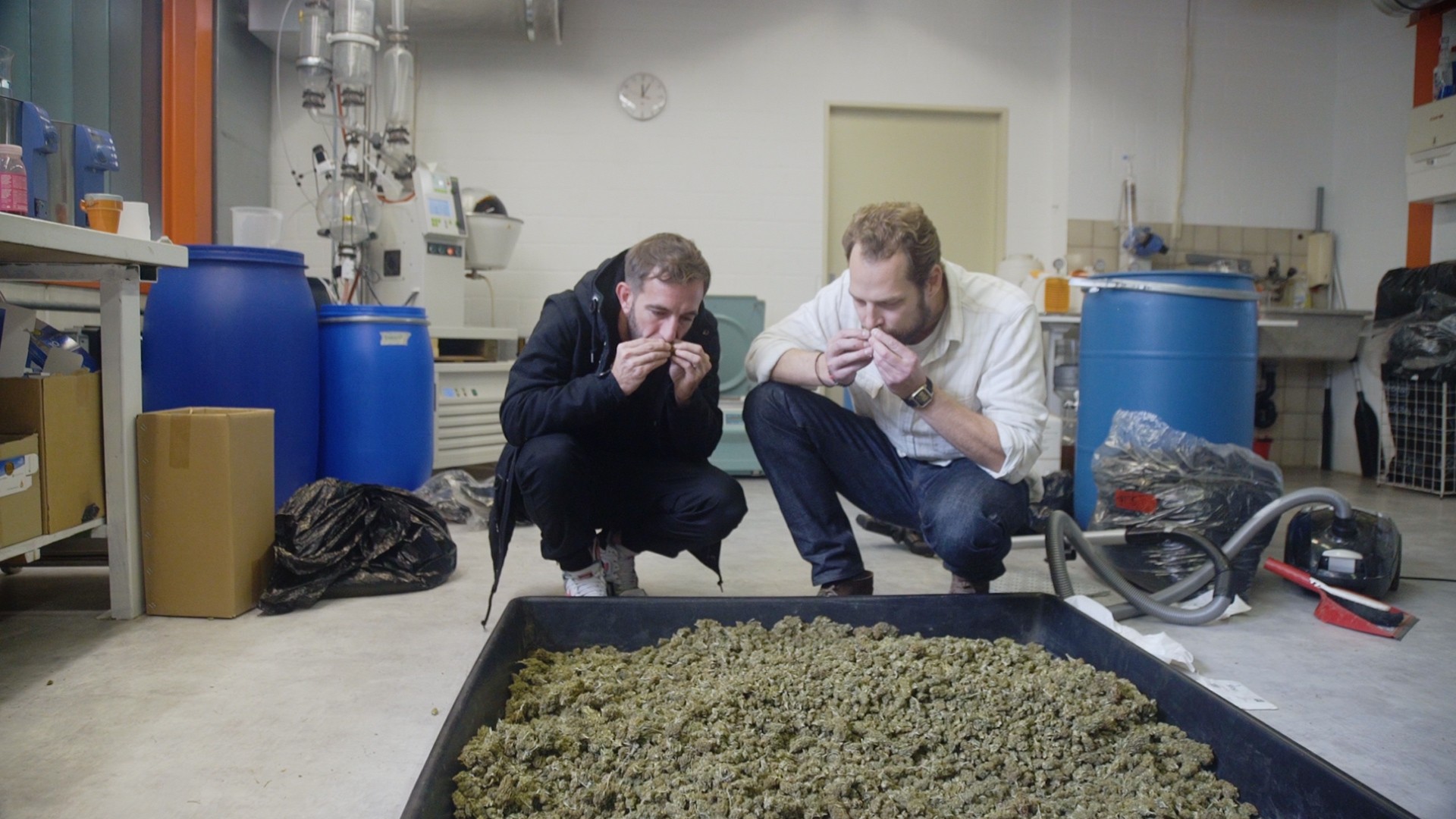Spencer Platt/Getty Images
The growing refrain condemning legal marijuana as the next Big Tobacco seems almost trite. After all, cigarettes kill 7 million people each year, according to the World Health Organization, while the cannabis death toll remains at zero. Although cannabis can cause anxiety and facilitate dependency in a minority of users, does pot really warrant comparisons with cigarette-pushing giants like Philip Morris?“I don't think that’s a fair assessment, but there are some concerns that the cannabis industry could mimic some of the problems that we have with Big Tobacco,” says Danielle Ramo, an associate professor who studies tobacco and marijuana co-use at the University of California San Francisco. Ramo is concerned that recreational marijuana markets may become more profit-driven than their medical equivalents. “They might try to bring forth messaging that tries first to get new customers and doesn't necessarily have that public health’s best interests at heart.”But the relationship between tobacco and cannabis goes deeper than that. Obviously, both are smoked, often together in spliffs or blunts. Some epidemiological data suggests puffing one encourages use of the other. (This co-use is 1 percent higher in states with medical marijuana.) “There's a limited amount of research saying that there might also be some brain vulnerabilities that perpetuate co-use,” Ramo adds, but we’re still trying to wrap our heads around this because studying pot isn’t exactly easy.“At this time, we do not completely understand the mechanisms underlying the co-use of cigarettes and cannabis,” explains Andrea Weinberger, a clinical psychologist specializing in substance use at Yeshiva University. Her team recently reported in the The Journal of Clinical Psychiatry that using cannabis may make it harder to quit smoking cigarettes. “There are overlaps in the neurobiological systems related to nicotine and cannabis. One substance may be used to enhance the rewarding effects or to reduce the negative effects, e.g. withdrawal, of the other substance.”However, a small but growing volume of research suggests a chemical in marijuana can actually help people quit smoking cigarettes, or smoke fewer of them. Smoking joints to quit smoking cancer sticks—how does that make any sense?It has to do with CBD, or cannabidiol. Most people know of THC, also known as delta-⁹-tetrahydrocannabinol, the compound in marijuana that makes you high. But CBD is the lesser-known, non-intoxicating cousin which has shown promise in treating epilepsy, anxiety, pain, and even addiction.
Watch More From VICE:
In a study published in Addiction in May, researchers at University College London found that CBD can reduce attentional bias to tobacco-related imagery. Attentional bias is when you focus strongly on certain stimuli—called “cues”—while ignoring others. For example, if you’re a smoker and you watch an old French film, all the fumes in the movie can make you crave a cig.Thirty patients were told to abstain from smoking for 12 hours and given 800 mg of CBD, orally, or a placebo. They were then shown images of ashtrays, lighters, or groups of smokers mixed in with neutral photos, such as a woman applying lipstick instead of putting a cigarette in her mouth.People who used CBD didn’t notice an impact on cravings or withdrawal, but found cigarette cues less appealing. The study supports the potential to target specific neurocognitive processes associated with nicotine using CBD.CBD has also been shown to influence addiction pathways more generally. Researchers hooked rats on cocaine and amphetamine, but found they could extinguish this conditioning by injecting them with THC or CBD. In another rat experiment, heroin-seeking behavior was reduced using CBD, even two weeks after exposure.One theory for how CBD works in addiction deals with how it regulates cannabinoid and AMPA receptors in the nucleus accumbens, a region of the brain strongly associated with addiction mechanisms.Of course, there is ever-growing evidence that states with legal marijuana programs see less opioid addiction and fewer overdoses, although some have argued against this point.Also worth considering are the potential anti-addictive properties of β-caryophyllene, an essential oil or terpenoid commonly found in cannabis and black pepper. In a 1994 study, 48 male smokers were given cigarette-sized tubes to freely suck on, some of which were filled with black pepper extract while others contained mint-menthol or placebo. Those who received the pepper extract saw a significant reduction in cravings compared to the other groups.There is some evidence that cannabinoids and terpenoids work together, known as the Entourage Effect. “CBD, with caryophyllene, and possibly other adjunctive terpenoids in the extract, offers significant promise in future addiction treatment,” Ethan Russo wrote in his 2011 paper “Taming THC,” an analysis that suggests when researching cannabis, we should look at the whole plant, not just singular extracts.
Advertisement
Advertisement
Watch More From VICE:

In a study published in Addiction in May, researchers at University College London found that CBD can reduce attentional bias to tobacco-related imagery. Attentional bias is when you focus strongly on certain stimuli—called “cues”—while ignoring others. For example, if you’re a smoker and you watch an old French film, all the fumes in the movie can make you crave a cig.Thirty patients were told to abstain from smoking for 12 hours and given 800 mg of CBD, orally, or a placebo. They were then shown images of ashtrays, lighters, or groups of smokers mixed in with neutral photos, such as a woman applying lipstick instead of putting a cigarette in her mouth.People who used CBD didn’t notice an impact on cravings or withdrawal, but found cigarette cues less appealing. The study supports the potential to target specific neurocognitive processes associated with nicotine using CBD.
Advertisement
However, the study’s lead author Chandni Hindocha, cautions that this research is very much in the translational stage—in other words, we need more study before we can draw conclusions.“CBD is being seen in the media as this kind of panacea that can just about treat everything,” says Hindocha, a PhD candidate at University College London. “I very much disagree with this and I don't think that people should take away from my study that they could start taking their own CBD oil and it will help them with their cigarette addiction.”Nonetheless, her work builds on a 2010 analysis which found that CBD could reduce attentional bias in 94 participants, potentially to treat cannabis dependency. There’s also a small 2013 study published in Addictive Behaviors which found that people who inhaled cannabidiol smoked about 40 percent fewer cigarettes than usual. Researchers gave two dozen smokers a metered-dose inhaler (picture an asthma inhaler) filled with CBD or placebo and observed a “dramatic reduction in the number of cigarettes smoked across a 7-day period in the individuals using the CBD inhaler.” People given the placebo showed no difference in the number of cigarettes smoked.“I thought it was promising [experimentation]. It showed that more research should be done in the area,” Ramo says, but notes the small sample size and the short follow-up period as limitations. “Their outcome measure was ‘reduction of cigarettes smoked,’ which is not as common in clinical trials of smoking as looking at abstinence. So I'd like to see more studies with larger samples, longer follow-up, and actually looking at cessation as an outcome.”
Advertisement
Advertisement
All of this is to say, we’re still figuring out what role cannabis plays in addiction science. Cannabis itself can facilitate dependency in about 9 percent of people. For cocaine, it’s around 21 percent, alcohol almost 23 percent, and for nicotine it’s nearly 68 percent of users that will develop dependency.While CBD could be developed as an effective addiction therapy, the fact remains we currently have more evidence to suggest cannabis use encourages cigarette use rather than deters it. However, those studies also raise questions. They rely on survey data with large sample sizes, which are self-reported and may be prone to reporting bias—that is, respondents may be reluctant to reveal certain behaviors, such as illicit drug use, or may forget their frequency of use, etc. It’s also not possible to absolutely pin a direct cause from a correlation without more evidence.Route of administration is important to consider, too—these epidemiological surveys fail to tally whether cannabis is ingested via joints, vaporizers, edibles, or some other form. After all, smoking a doobie might remind you more of smoking a cigarette than eating a weed cookie would.“Cues related to cannabis use may also become related to nicotine use,” Weinberger says. “For someone who uses cannabis and then smoked a cigarette, the act of using cannabis—and all of the contextual cues surrounding the act—could become a cue for smoking cigarettes.” That is, they'd come to associate the two.As we begin to better understand how cannabis interacts with the brain, we can strategize health policies that make sense for the new legal marijuana industry. Comparing pot to Big Tobacco isn’t completely accurate, but at the same time there are some similarities and we should be cautious, Ramo advises.“Legalization is here,” Ramo says. “It's happening in more and more states almost every single year, so we ought to be thinking about what the public health implications are of legalization. We should be studying what the effects are of cannabis legalization on the use of other substances, including the most common legal substances: tobacco and alcohol. It's likely that, for some people, legalization will mean they smoke more marijuana and smoke more cigarettes.”Sign up for our newsletter to get the best of Tonic delivered to your inbox.
